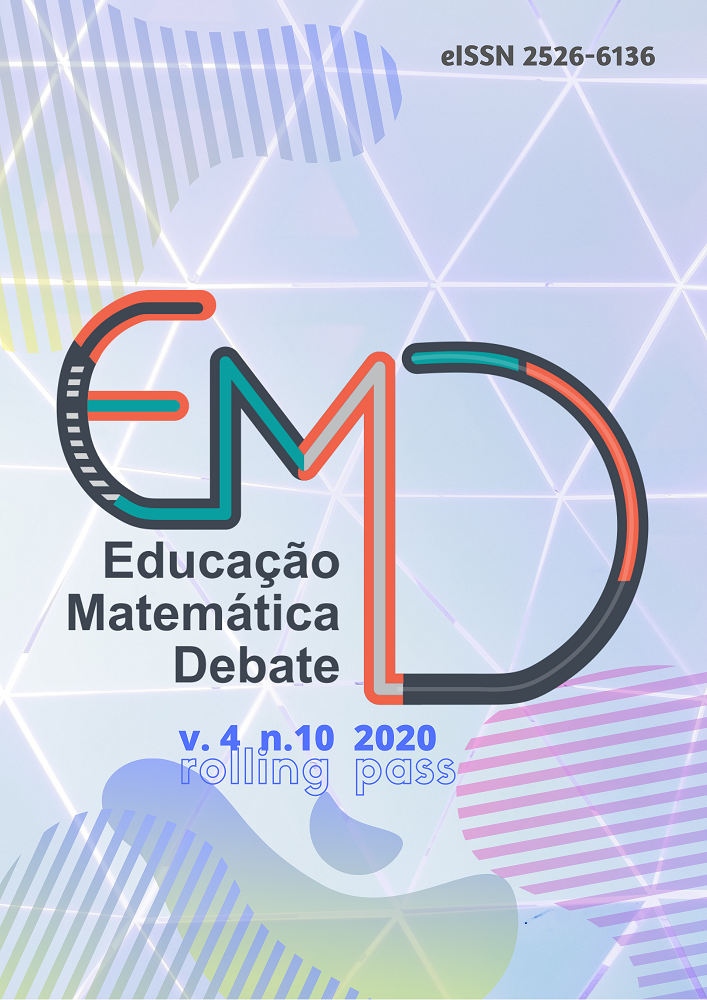The Geometry teaching with rhymes: the formative action
DOI:
10.46551/emd.e202056Keywords:
Mathematics Education, Teacher training, Teaching and Learning, Geometry, RhymesAbstract
This article is the result of continuing education with teachers, the institution's coordinator, and scholarship students from the Institutional Program for Teaching Initiation Scholarships (PIBID). The actions were developed in the project of the Interdisciplinary Laboratory for the Training of Educators (LIFE) of the Federal University of Grande Dourados in Mato Grosso do Sul, Brazil. Our objective was to promote the reflection of this training group using resources such as: texts that are known by heart, relating them to activities of mathematical content, whatever, - Geometry. We thus highlight the importance of using texts for interdisciplinary teaching. The training developed the following activities: theoretical background, presentation of the rhymes, dynamics of the sung rhymes — skipping rope, reflection on what activities can be carried out, request for representation by drawing the rhymes. Given this formation, we realized the need to carry out interdisciplinary and collaborative training actions, encouraging a playful and enjoyable formation for the teaching of Geometry.
Downloads
References
BJORKLUND, Camila. Aspects of challenged numbers in the game and in the interaction of toddlers. In: CONGRESS OF EUROPEAN RESEARCH IN MATHEMATICS EDUCATION, 10, 2017, Dublin. Proceeding of CERME 10. Dublin: ERME; Dublin City University, 2017, p. 1821-1828.
BRASIL. Ministério da Educação. Secretaria de Educação Fundamental. Programa de Formação de Professores Alfabetizadores. Coletânea de textos do Módulo 2. Brasília: MEC/SEF, 2001.
CARRILLO-YAÑEZ, José; CLIMENT, Nuria; MONTES, Miguel; CONTRERAS, Luis Carlos; FLORES-MEDRANO, Eric; ESCUDERO-ÁVILA, Dinazar; VASCO, Diana; ROJAS, Nielka; FLORES, Pablo; AGUILAR-GONZÁLEZ, Álvaro; RIBEIRO, Miguel; MUÑOZ-CATALÁN, María-Cinta. The mathematics teacher’s specialised knowledge (MTSK) model. Research in Mathematics Education, v. 20, n. 3, p. 236-253, jul. 2018.
EMIRENE, Jessica. La na casa da vizinha. In: SANTOS, Fábio Vieira dos; RIBEIRO, Jackson da Silva Ribeiro; PESSOA, Karina Alessandra. A escola é nossa: Alfabetização Matemática, 1º ano. São Paulo: Scipione, 2008, p. 20.
JELINEK, Karin Ritter; ADAM, Márcia Viviane dos Santos. Alfabetização Matemática entrelaçada à Literatura Infantil: um estudo da percepção de professores alfabetizadores. Tangram, Dourados, v. 3, n. 1, p. 46- 61, mar. 2020.
KAMII, Constance. A criança e o número: implicações educacionais da Teoria de Piaget para a atuação junto a escolares de 4 a 6 anos. Tradução de Regina Alcântara de Assis. Campinas: Papirus, 1995.
LIMA, Paulo Figueiredo; CARVALHO, João Bosco Pitombeira Fernandes. Geometria. In: CARVALHO, João Bosco Pitombeira Fernandes (Coord.). Coleção Explorando o Ensino: Matemática — Ensino Fundamental. Brasília: MEC/SEB, 2010, p. 135-166.
LOZADA, Claudia de Oliveira; MORRONE, Wagner; ARAÚJO, Mauro Sérgio Teixeira de; LOZADA, Anneliese de Oliveira. O formalismo matemático na representação dos modelos em contextos interdisciplinares de modelagem matemática. Tangram, Dourados, v. 1, n. 2, p. 105-124, jun. 2018.
MASOLA, Wilson de Jesus; ALLEVATO, Norma Suely Gomes. Dificuldades de aprendizagem matemática: algumas reflexões. Educação Matemática Debate, Montes Claros, v. 3, n. 7, p. 52-67, jan./abr. 2019.
SÃO PAULO (Estado). Secretaria de Estado da Educação. Ler e escrever: Guia de Planejamento e Orientações Didáticas. Professor Alfabetizador — 1º ano. 4 ed. São Paulo: SEE, 2014.
SILVA, Rosemeire Jesus. Literatura infantil para o ensino de Matemática inclusiva. 2017. Trabalho de Conclusão de Curso (Pedagogia) — Faculdade de Educação. Universidade Federal de Grande Dourados.
WEISZ, Telma. O diálogo entre o ensino e a aprendizagem. São Paulo, Ática. 1999.
Downloads
Additional Files
Published
How to Cite
Issue
Section
License

This work is licensed under a Creative Commons Attribution-NonCommercial-ShareAlike 4.0 International License.





















